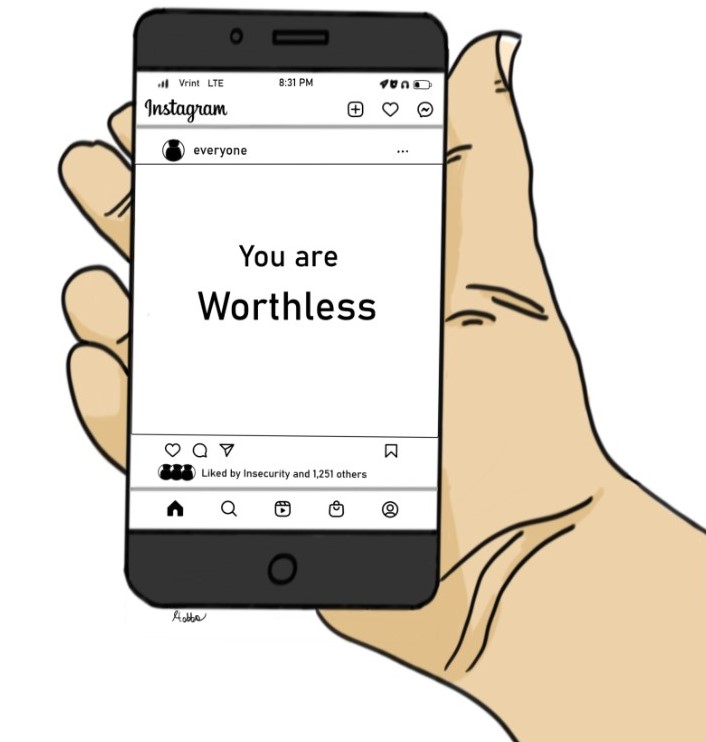Let’s #MakeInstaCasualAgain, for the Sake of our Mental Health
The #makeinstacasualagain movement has benefits from the mental health of students.
February 5, 2021
The hashtag #makeinstacasualagain has floated around Instagram for years, with users longing for the platform to return to the carefree atmosphere it had when it debuted in 2010. While this hashtag has mostly been used sarcastically, there’s much truth to it.
Social media can have some great benefits, most notably in providing an opportunity to connect with friends and peers, especially amid the social isolation the past year has posed. Too often though, Instagram enforces expectations that hold life to unrealistic standards and are difficult to shake when hours of our time are spent mindlessly scrolling through the app.
Instagram is a highlight reel. Posts usually feature pictures out having fun with friends, on a beach in Hawaii, and of course, meticulously chosen birthday posts. It is easy to get caught up seeing these posts and think that these people are on top of the world. But what we don’t see being posted are the sleepless nights working on Collegio homework or lamenting the general state of the world, at least that’s more of a Snapchat private story type of thing for me. But that’s reality—nobody’s laying on a Hawaiian beach 24/7, not literally, not metaphorically. And after a year where we’ve all logged more hours online, this can get into our heads more than ever.
Prep counselor Dr. Rosellini said, “Often, what we see on social media reflects cool/interesting things that people are doing, and probably picking the ‘best’ looking picture of themselves (and often filtering it to make it look even better/cooler!). So, what we end up scrolling through often is seeing one side of other peoples’ lives, which may not be realistic. And it can make us then feel less than, or isolated.”
Through a poll conducted on the Prep Instagram, around 150 Prep students were asked “Has Instagram negatively impacted your mental health?” The results were pretty 50/50, with 49% of respondents saying “yes.” Of that 49%; 73% of all girls responded “yes” compared to just 19% of boys. Studies have backed this high percentage up, tying high screen time on Instagram to increased levels of anxiety and depression in adolescents.
Sophie Docktor ‘22 identified that it has negatively impacted her mental health because there is “so much pressure about what to post and about looking good.”
Follower counts can evoke similar feelings of anxiety. Another poll asked: “Do you believe there is pressure to have a certain number of followers on Instagram?” Of the students polled, 37% responded “yes”. Girls showed an increased percentage, with 50% responding in the affirmative compared to just 23% of boys. When asked how many followers the 37% felt pressured to have, all the students who responded stated “1,000+.” Unsurprisingly, 64% of those who did not feel any follower-related pressure, have 1,000+ followers themselves. That percentage suggests a direct indication that most people’s “golden” follower count is 1,000.
Freshman Brooke Wilwerding identified that reaching these high numbers can “make you feel better about yourself.”
Rosellini commented that it seems “pretty normal” to want a lot of followers, “but what seems to happen a lot is this pressure to have more friends/followers, and equating that number with how we feel about ourselves, or how liked we are, and other unhelpful comparisons. Then social media becomes at least partially related to self-worth rather than a means of connection.”
Gen-Z, a generation you’d think would be more connected than ever through the social media boom that has gripped our upbringings, has only made us feel the opposite—alone.
Instagram has “made it the norm to only see the ‘best’ carefully crafted things a person wants you to see, and to communicate behind a phone rather than in person. This misses the in-person real vulnerable connections where you get to know people, including potentially their flaws.” Rosellini added.
Stop caring about followers. They do not matter, and if someone thinks they do in judging if you’re “cool” or not, odds are, they’re not someone you should be friends with in the first place. Stop caring about posting the best-edited picture of yourself. Posts reflect nothing more than the “highlight reel” of one’s life. Stop caring about what a “like” or a “follow” means, but know your worth and evaluate the real-life, vulnerable connections Instagram corrupts. While it can be hard to be vulnerable, you’ll be surprised at how being a little bit more real on the platform can help ourselves and society in the long-term. Let’s #makeinstacasualagain.
For more see Instagram Accounts to Follow to Boost Mental Health



